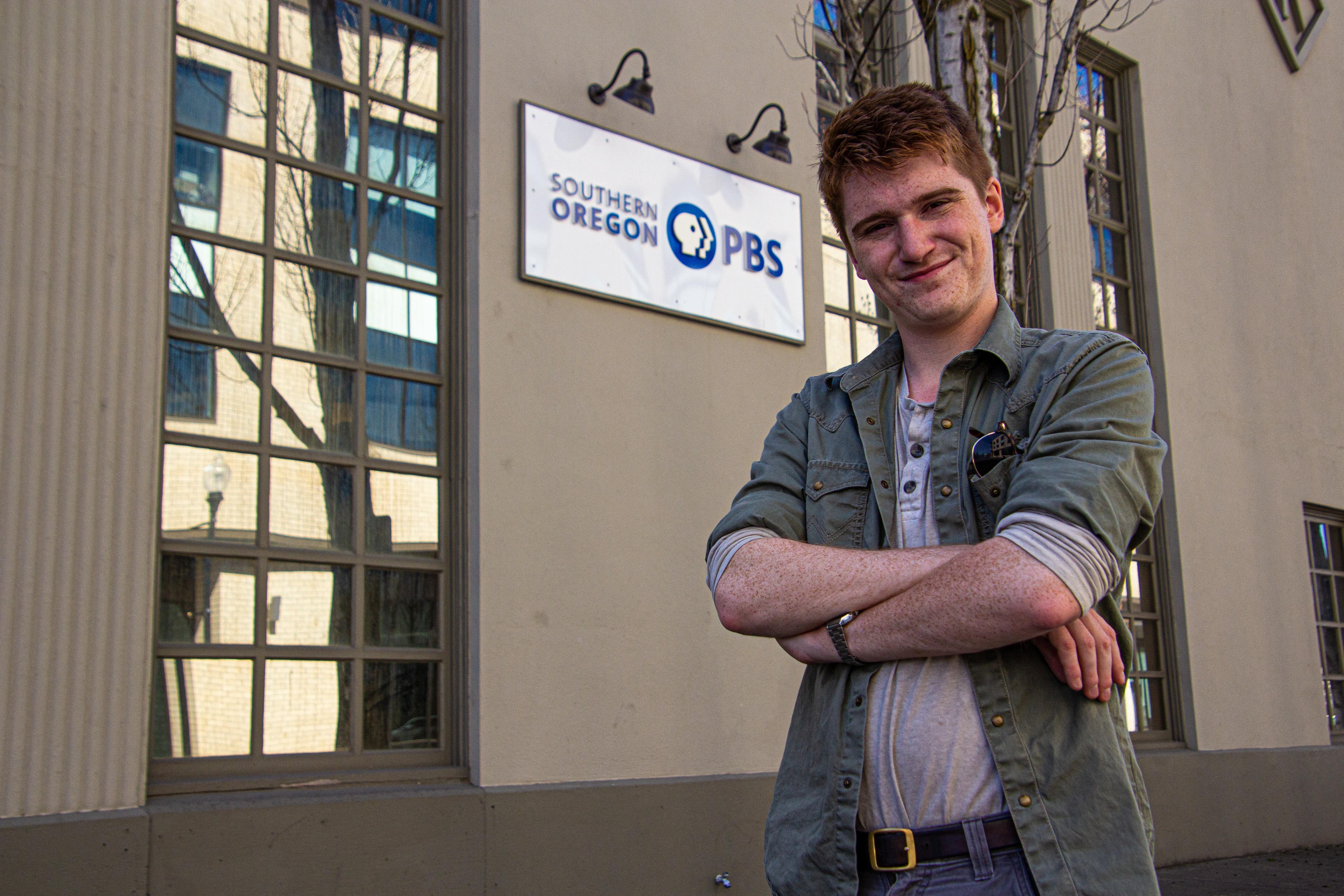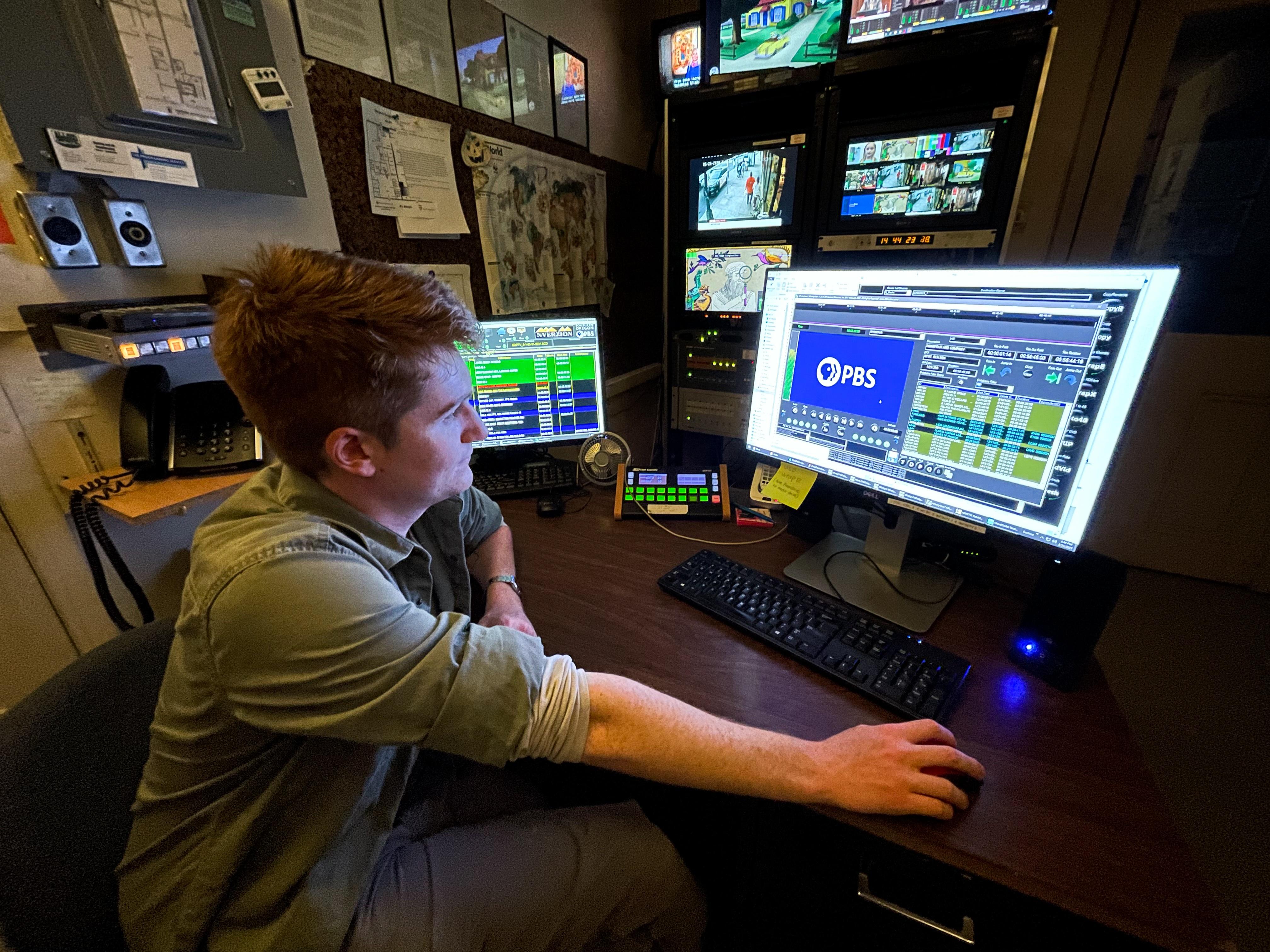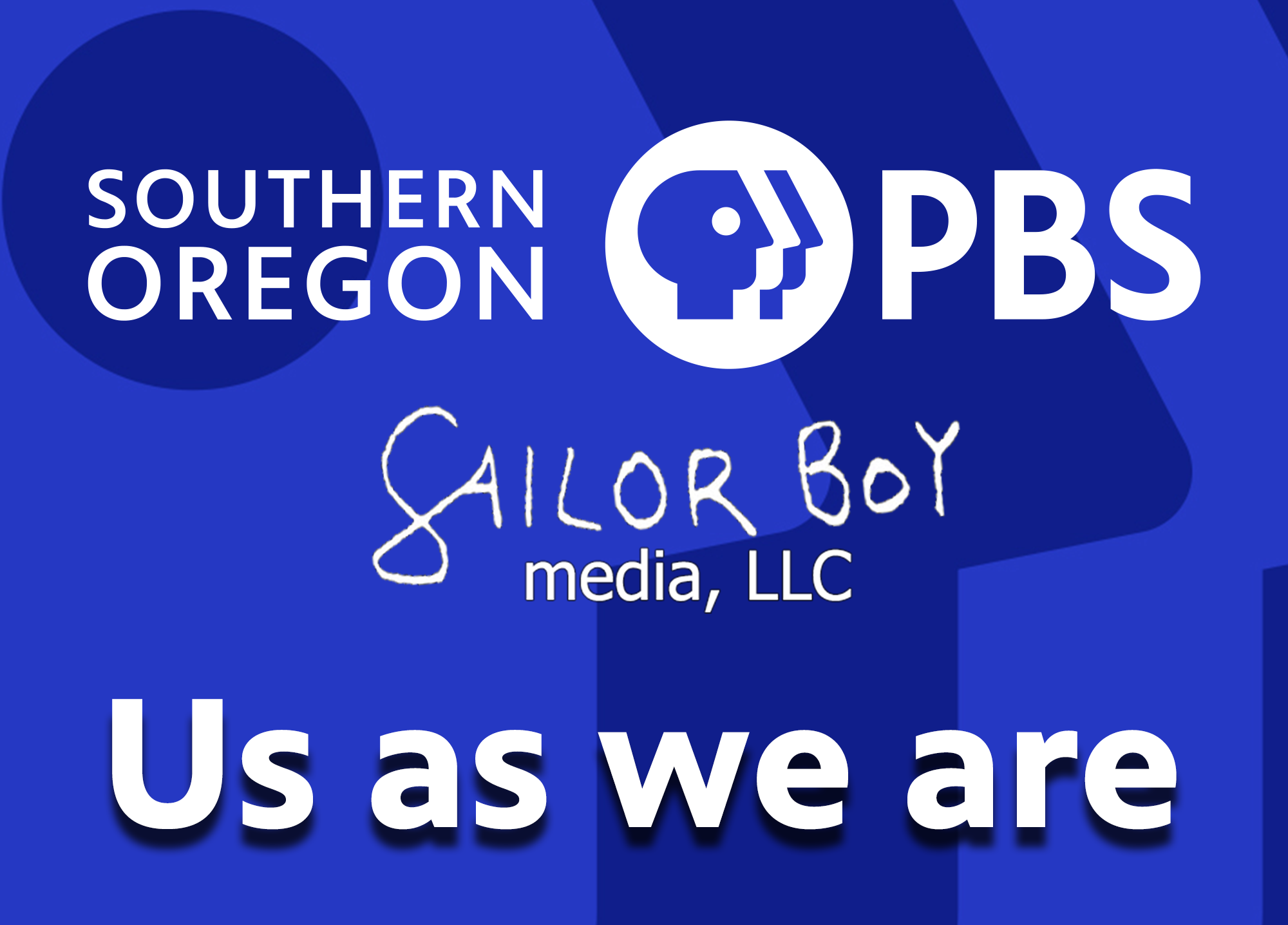Presenting Our Community, Just As We Are
From the Master Control Booth at SO PBS to out in the streets filming current events as they happen, Keegan Van Hook is enhancing the SO PBS Community daily.

Keegan Van Hook is a man on a mission.
His official relationship with Southern Oregon PBS started when he took a job as a Master Control Operator and Media Asset Coordinator. This job requires strict attention to detail, demanding that Van Hook regularly monitor several systems to ensure signal quality and output. He works mostly alone in the master control booth in the basement of the station, coming to work in the afternoons and leaving after primetime.
But his work in the booth may not be how SO PBS viewers are most familiar with him.
In his spare time, he is an enterprising film maker set on capturing life in our region through an unvarnished lens. Somewhat self-taught, Van Hook has been compiling, honing, and practicing a wide assortment of video skills, including editing, hosting and producing.
“I have actually been teaching myself filmmaking and video for a long time. I used to go to the Northwest Film Center in Portland,” said Van Hook. “When I was a kid I took a couple of classes there and then started renting cameras from them. Eventually I came upon a camera of my own and started amassing equipment. Since then I have just been teaching myself how to do things and watching a lot of YouTube tutorials.”

From his Northwest Film Center roots, Van Hook went on to attend Southern Oregon University, switching majors from theater to emerging media & digital arts and then to communications. While he gained valuable knowledge and experience enrolled as a student, he credits a college job as giving him the confidence he needed to realize video production could be a serious pursuit for himself.
“I worked at RVTV as the public access coordinator for a while. That was a really great job,” remembers Van Hook. “It consisted of helping teach a bunch of people how to run cameras and edit videos and all sorts of stuff. It is sort of the cliché, but there is truth in the saying: ‘When you teach somebody how to do something, it really solidifies your knowledge of it.’ It gave me the confidence that I actually knew what I was talking about when it came to basic sort of filmmaking stuff.”
Now, Van Hook is the creator behind the short series, “Us As We Are,” which airs on Southern Oregon PBS, with longer versions found on YouTube. The series started as an urge to capture a Medford protest, but quickly found its way to a much larger stage.

“There was a huge protest in here Medford in June following the incident in Minneapolis involving George Floyd. For some reason, I felt really compelled to go film that. It just occurred to me that that would be a thing to do. I don’t think there was really any deeper thought, other than, ‘Oh, there is a huge protest that doesn’t happen very often, and I have a camera with me. I should just go shoot it.’”
Van Hook ended up capturing an instance at that protest that drew national attention.
“I captured the incident where the former mayor of Phoenix, Chris Luz, hit a girl with his car, or bumped into her, a lot of people say different things about it. But I was there and managed to capture the video of the incident going down. I put it on my YouTube channel as a roughly edited thing, and the Washington Post ended up writing a story about it and included a link to my video in their article. It got like 80K views. That was a big uptick for me. I had never seen those kinds of numbers on a video I have made. It was pretty exciting,” said Van Hook.
“I thought there was maybe some real value in doing this kind of stuff. And I had done documentary things before anyway, so it wasn’t completely out of my wheelhouse, capturing these things as they happen. Basically, I was just riding the excitement of that initial video doing well and sort of the feeling I was capturing historic things for the Rogue Valley.”
Van Hook and his friend and videographer, Tripp White, started attending other events, going to them with the intention of filming the community with as little as preconceptions as possible. In the span of the last year, the two have worked together in developing their formula. Van Hook handles the on camera interviews, while White does the camera work and both collaborate on the editing and story ideas.
“I'm the face of the show and it was initially my idea that got us into it, but as it stands today, it's very much a collaboration [between Van Hook and White]. He's a core inner-circle creative partner,” said Van Hook. “I think it's probably the biggest blessing I have in life that people like Tripp see the merit in my ideas and contribute so much to improving them and making them happen.”
Community is the core of this video series, and coincidentally, the name for the series came from another person well-known to the SO PBS community.
“During an interview with Julie Akins (who has produced many programs for SO PBS) on the fourth of July, she said something like, ‘Thanks for coming out and doing what you do. Recording us as we are and everything.’ And I realized, that was the title now,” remembers Van Hook. “There was never any point where we were like, let’s do a series. It just evolved over time. We adapted a style and a nature. Now there is kind of a formula behind it, but that came about naturally, I guess.”
Van hook is set on getting people to really hear and see their neighbors in a way they may not have done thus far. To him, understanding someone’s point of view, if it if differs drastically from your own, is key to keeping America’s ideals intact.
“A lot of news seems to try to create a certain narrative. I see a lot of journalism, and I do think there is value in this, but it’s journalism that has a mission, like We’re trying to make the world better with our journalism. And I think that is a good thing to do. I have ideas for certain journalistic projects that fall along those lines. But the pitfall with that sort of journalism is that it can get you into “confirmation bias mode,” where you particularly seek out specific stories or interviews or listen to certain people over others.”
Van Hook points to one instance, where he filmed an episode at an anti-mask protest in Ashland, to illustrate his point.
“A lot of the protestors there, in addition to saying a lot of stuff that I felt was sort of crazy, also said things that weren’t wrong. It was like, ‘Okay, yeah. You have a point. That is a legitimate grievance.’,” said Van Hook. “I think it would be unwise to dismiss all of the points that were made just because I may disagree with them on one subject.
“I think that is a way of thinking that people slip into a lot and it isn’t helpful. It makes us miss a lot of things that we shouldn’t. “Us As We Are” is a platform that encourages us to listen to other people with maybe a bit more of an objective ear. To help people say, ‘Okay what are you saying that I agree with and what are you saying that I disagree with?’ Our goal is to find more of nuanced middle position, while presenting the truth that nobody has this all figured out.”
As for Van Hook’s future, he plans to continue developing his film production skills while working at the station. And his measure of his success reflects his mindset of thinking big.
“I have a lot of ambitious ideas. Everyone seems to be looking at going to space. If that future unfolds, people going out into space, there will be stories that are happening out there,” posits Van Hook. “There is a whole other side of me that would love to do this sort of journalism in space. That is my hobby interest, I am very interested in space travel. If I could be the Jacques Cousteau of space travel, that would be the dream.”